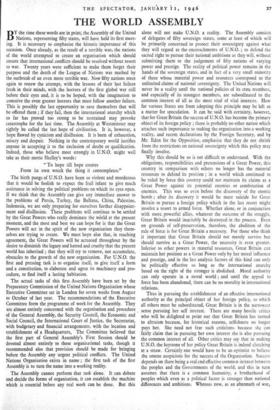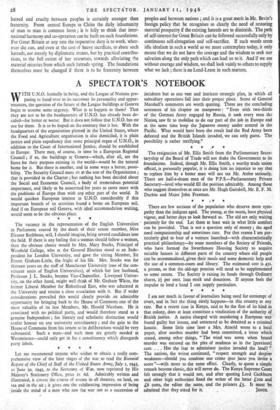THE WORLD ASSEMBLY
BY the time these words are in print, the Assembly of the United Nations, representing fifty states, will have held its first meet- ing. It is necessary to emphasise the historic importance of this occasion. Once already, as the result of a terrible wars the nations of the world attempted to create an organisation which should ensure that international conflicts should be resolved without resort to war. Twenty years were sufficient to make them forget their purpose and the death of the League of Nations was marked by the outbreak of an even more terrible war. Now fifty nations meet again to renew the attempt, with the lessons of their last failure fresh in their minds, with the horrors of the first global war still before their eyes and, it is to be hoped, with the imagination to conceive the even greater horrors that must follow another failure. This is possibly the last opportunity to save themselves that will be offered them ; if they fail, then the international anarchy which so far has proved too strong to be restrained may provoke catastrophe for the last time. The Assembly at Westminster may rightly be called the last hope of civilisation. It is, however, a hope flawed by cynicism and disillusion. It is born of exhaustion, misery and despair. Nothing in the contemporary world justifies anyone in accepting it to the exclusion of doubt or qualification. Indeed, those who believe most strongly in U.N.O. might well take as their motto Shelley's words: "To hope till hope creates . From its own wreck the thing it contemplates."
The birth pangs of U.N.O. have been so violent and murderous that it would be foolish to expect the frail infant to give much assistance in solving the political problems on which its eyes open. If we think that the Assembly can give any immediate answer to the problems of Persia, Turkey, the Balkans, China, Palestine, Indonesia, we are only preparing for ourselves further disappoint- ment and disillusion. These problems will continue to be settled by the-Great Powers who really dominate the wiirld at the present moment, and the most and best we can hope for is that the Great Powers will act in the spirit of the new organisation they them- selves are trying to create. We must hope also that, in reaching agreement, the Great Powers will be actuated throughout by the desire to diminish the legacy and hatred and cruelty that the present world has inherited ; that they will try to remove, not accumulate, obstacles to the growth of the new organisation. For U.N.O. the first and pressing task is to organise itself, to give itself a form and a constitution, to elaborate and agree its machinery and pro- cedure, to find itself a lasting habitation.
The actual tasks of this first. Assembly have been set by the Preparatory Commission of the United Nations Organisation whose Executive Committee sat in London for seven weeks from August to October of last year. The recommendations of the Executive Committee form the programme of work for the Assembly. They are almost entirely concerned with the organisation and procedure of the General Assembly, the Security Council, the Economic and Social Council, the International Court of Justice, the Secretariat, with budgetary and financial arrangements, with the location and establishment of a Headquarters. The Committee believed that the first part of General Assembly's First Session should be devoted almost entirely to these organisational tasks, though it recommended also that provision should be made for bringing before the Assembly any urgent political conflicts. The United Nations Organisation exists in name ; the first task of the first Assembly is to turn the name into a working reality.
The Assembly cannot perform that task alone: It can debate and decide the forms of organisation, it can establish the machine which is essential before any real work can be done. But this alone will not make U.N.O. a reality. The Assembly consists of delegates of fifty sovereign states, some at least of which will be primarily concerned to protect their sovereignty against what they will regard as the encroachments of U.N.O.; to defend the sacred right to pursue their national ambitions as they will, without submitting them to the judgement of fifty nations of varying power and prestige. The reality of political power remains in the hands of the sovereign states, and in fact of a very small minority of these whose material power and resources correspond to the unlimited claims of national sovereignty. The United Nations will never be a reality until the national policies of its state members, and especially of its strongest members, are subordinated to the common interest of all as the most vital of vital interests. How far various States are from adopting this principle may be left as a matter for speculation. It can be said with certainty, however, that for Great Britain the success of U.N.O. has become the primary object of its foreign policy ; there is probably no other nation which attaches such importance to making the organisation into a working reality, and recent declarations by the Foreign Secretary, and by Mr. Eden for the Opposition, emphasise that they do not shrink from the restrictions on national sovereignty which this policy may finally involve.
Why this should be so is not difficult to understand. With the obligations, responsibilities and pretensions of a Great Power, this country in comparison with others no longer has the material resources to defend its position ; in a world which continued to be ruled by force this country could not maintain its claims as a Great Power against its potential enemies or combination of enemies. This was so even before the discovery of the atomic bomb ; after its discovery it would be mere suicide for Great Britain to pursue a foreign policy which in the last resort might involve a resort to armed force. Whether alone, or in conjunction with more, powerful allies, whatever the outcome of the struggle, Great Britain would inevitably be destroyed in the process. Even on grounds of self-preservation, therefore, the abolition of the rule of force is for Great Britain a necessity. For those who think it important that Great Britain should not merely survive but should survive as a Great Power, the necessity is even greater. Inferior to other powers in material resources, Great Britain can maintain her position as a Great Power only by her moral influence and prestige, and in the last analysis factors of this kind can only be politically effective so long as the international anarchy based on the right of the stronger is abolished. Moral authority can only operate in a moral world ; and until the appeal to force has been abandoned, there can be no morality in international relations.
Thus in pursuing the establishment of an effective international authority as the principal object of her foreign policy, to which all others must be subordinated, Great Britain is in the narrowest . sense pursuing her self interest. There are many hostile critics who will be delighted to point out that Great Britain has turned to altruism because, ,for historical reasons, selfishness no longer pays her. She need not fear such criticisms because she can fairly claim that in pursuing her own interest she is also pursuing the common interest of all. Other critics may say that in making U.N.O. the keystone of her policy Great Britain is indeed clutching at a straw. Certainly one would have to be an optimist to believe the omens auspiciots for the success of the Organisation. Success depends on there being a real;nd effective common interest between the peoples and the Governments of the world, and this in turn assumes that there is a common humanity, a brotherhood of peoples which even as a political factor is stronger than national differences and ambitions. Whereas now, as an aftermath of war, hatred and cruelty .between peoples is certainly stronger than fraternity. From central Europe to China the daily inhumanity of man to man is common form ; it is folly to think that inter- national harmony and co-operation can be built on such foundations. For. Great Britain at any rate the imperative duty is to work, wher- ever she can, and even at the cost of heavy sacrifices, to abate such hatreds, not merely by diplomatic means, but by practical contribu- tions, to the full extent of her resources, towards alleviating the material miseries from which such hatreds spring. The foundations themselves must be changed if there is to be fraternity between peoples and between nations ; and it is a great merit in Mr. Bevin's foreign policy that he recognises so clearly the need of restoring material prosperity if the existing hatreds are to diminish The path of self-interest for Great Britain can be followed successfully only by continuous self-abnegation and self-sacrifice. If such words seem idle idealism in such a world as we must contemplate today, it only means that we do not have the courage and the wisdom to seek our salvation along the only path which can lead us to it. And if we are without courage and wisdom, we shall look vainly to others to supply what we lack ; there is no Lend-Lease in such matters.































 Previous page
Previous page